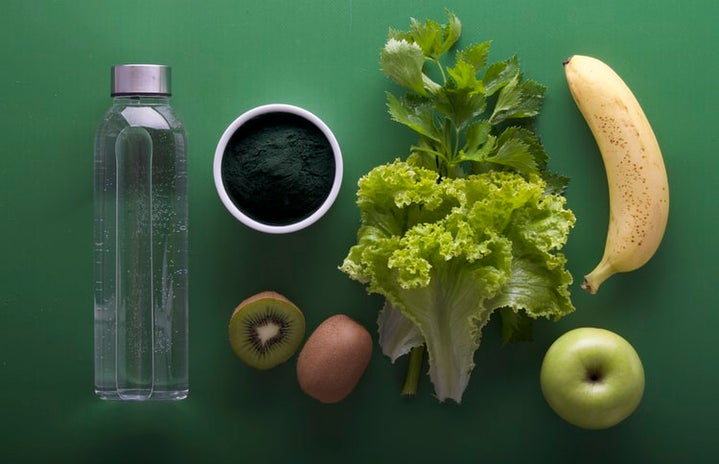TW: disordered eating and calorie counting
Merriam-Webster defines “healthy” as “beneficial to one’s physical, mental, or emotional state : conducive to or associated with good health or reduced risk of disease”. So why is it that we so easily dismiss and restrict our favorite foods because society usually deems them as ‘unhealthy’? This is a question that I’ve been pondering for quite some time, and it’s led me to some interesting conclusions.
When quarantine started, I was bored. Eventually, after spending mindless hours scrolling through every social media outlet, I started to see more fitness related content, which led me to take a look in the mirror. I decided I wanted to lose weight, so I started calorie counting. I started doing YouTube home workouts and soon I developed an efficient routine. After losing about 10 pounds and getting a million comments from my friends and family, I got really frustrated. All of a sudden, I was aware that the reason they made these comments was because I was obviously thinner than before. Was it really that noticeable? Were these 10 pounds such a drastic addition to my body? I soon recognized that my behavior was entering into uncharted waters, negative self-talk I’d never experienced before, and I came to identify the beginning of disordered eating patterns in my everyday life.
If there’s one thing you need to know about me it’s this: I love food. I love eating, cooking, baking, observing, and even writing about food. So when I started to lower my calorie intake and found myself dreading meals, I had to really take a step back and reassess the source of these horrible thoughts. Even worse, the 10 pounds I had lost made me feel smaller and weaker, not healthier. Why had I set out to lose this weight in the first place?
After speaking with friends and other college-age girls, I’ve realized that situations like these are all too common and relevant in our daily lives. Instead of fostering and encouraging girls to have a positive relationship with food, fitness, and their bodies, industries everywhere profit off of our insecurities and fake constructions of ‘health.’Why did I think losing weight would make me ‘healthier’? Why do we associate health with weight loss, when in fact, health is entirely subjective? These industries and companies like to place an aesthetically pleasing label on any ‘natural’ food, placed so satisfyingly in huge letters, “Healthy”.
I’m going to be completely honest with you. Health is about a lot more than your caloric intake or your weight. Health is not only physical, but mental. Health cannot be achieved by simply making yourself smaller. Everybody has a different journey and relationship with fitness, food, and their body, which is why it’s so imperative to step back from the photos or content you see on social media and recognize that holding yourself to impossible standards or goals will only hurt your mental health in the long run.
While calorie counting may not be for everyone, there are some steps I’ve started to take to make more conscious food choices. Instead of automatically reading the calories, I read the balance of protein, fats, and carbs to see it’s true value in my diet. I tend to focus on high protein items, because protein is meant to keep you full and build muscle! While that may be my personal preference, there are always foods I just choose to enjoy. Dessert is my weakness, and if I don’t have something sweet after dinner, I know I wont be able to go to bed happy.
Here’s the bottom line: being ‘healthy’ means feeling good, whatever that looks like for you. Personally, I think that the ultimate sign of perfect health is happiness. I know I will never be able to achieve pure happiness without a few extra chocolate chip cookies after dinner and I will gladly eat them with a smile on my face. You should too!



